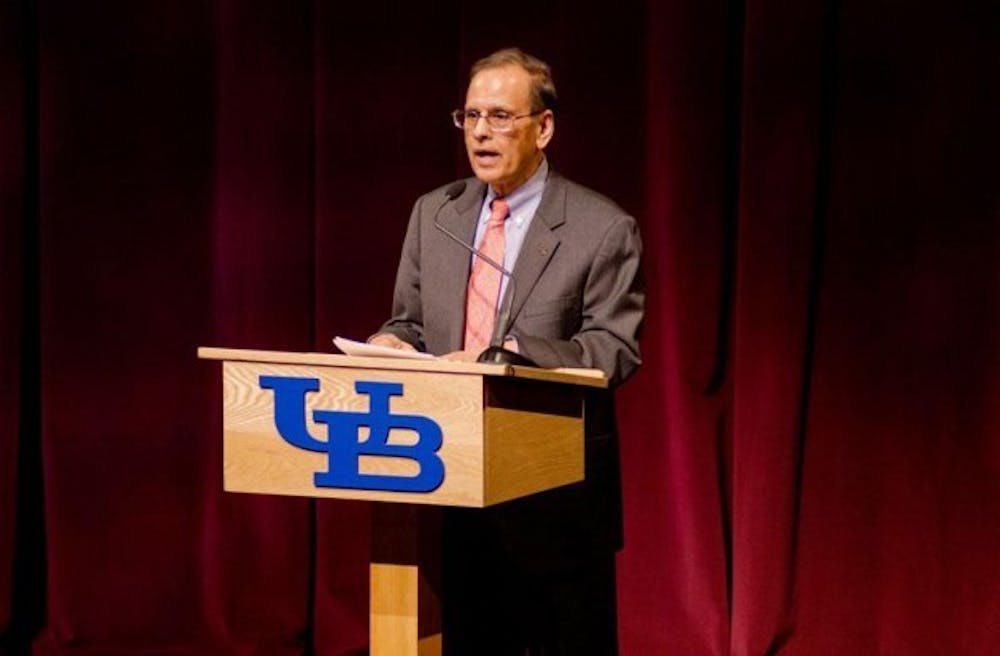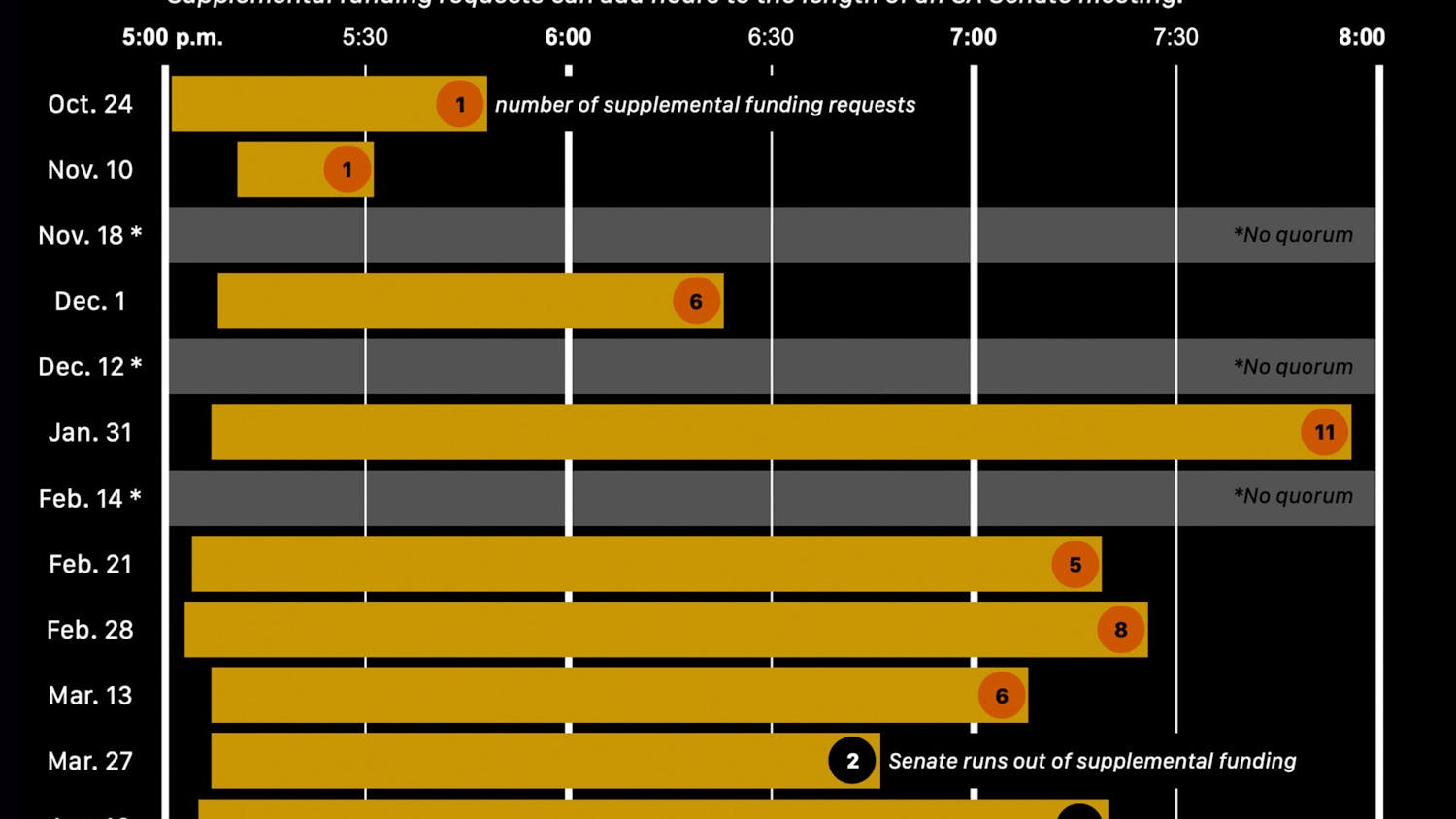President Satish Tripathi says he does not have the "legal authority" to make how the university spends its nearly $1 billion endowment and assets public or available for faculty scrutiny.
The money and resources are managed by the UB Foundation, a non-profit private institution that collects all funds donated to UB. In a letter received by faculty senators Monday, Tripathi said the Foundation "is outside of [his] purview as University at Buffalo President."
He went on to write, "Neither I as President, nor the University at Buffalo as an institution, have the legal authority to make available any records held by the UB Foundation as a private corporation."
The letter - dated March 5 - came in response to a motion passed by the Faculty Senate in December that asked Tripathi and the administration to "make available the budget of UBF and its associated foundations as if it were subject to [the Freedom of Information Law]." The motion was passed by a 38-17 vote.
Faculty Senator Kenneth Dauber, an English professor who originated the motion, said he's baffled by Tripathi's decision. After the motion was passed in December, Dauber told The Spectrum he knows of no laws that require UBF to keep its books closed.
"The funds held by UBF are funds of the University at Buffalo administered by UBF at the direction of the President of UB," Dauber said in an email Tuesday. "I don't know what President Tripathi means when he says that UBF 'is outside of my purview as UB President.' The issue is very simple. SUNY Buffalo is a public institution. It is an academic institution. As both public and academic, its most basic value is transparency. The Faculty Senate asked the President to make transparent the financial operations of UBF. The President said no. I do not know why."
Several faculty senators say they are asking for transparency because they want to understand how the university spends its endowment and where exactly money donated to and raised by the university ends up.
Martha McCluskey, a law professor and faculty senator, said she, too, knows of no laws that would prevent the disclosure to the faculty and the public. "UBF apparently delegates to UB's President almost all the important decisions about how to spend and raise UBF money," McCluskey said in an email. "As a public official, President Tripathi has the legal authority (and presumably the legal duty) to open records of UB's crucial decisions about UBF money to the Faculty Senate and to the public."
In previous Senate meetings, some faculty members have voiced concerns about having a private organization handle money for a public university.
The policy is not unique to UB or to SUNY. Most public universities in the country have private foundations that manage donations.
But there is movement around the country encouraging public access to internal records. California, as of Jan. 1, 2012, has a Transparency Act that brings academic foundations under the state's public record laws, which means all Californian foundations' financial records are open to the public and faculty for scrutiny. This is the kind of transparency some UB faculty is calling for.
Not all faculty thinks December's resolution was necessary. In December's meeting, Robert Wetherhold, a senator and professor of mechanical engineering, said he was uncertain of what issue the resolution aimed to solve and suggested the volume of information being asked for may not be appropriate for the public. Other senators were concerned about donors' privacy and were satisfied with the public-private relationship as it exists now.
Tripathi's letter also notes UBF makes its audited financial statements available on its website and states that UB will be adding IRS 990 tax forms.
The tax forms are currently made public by IRS tax rules. UBF's most recent 990, from fiscal year 2012, shows it processed $4.7 million on student scholarships, $8.1 million on office expenses, $3.1 million for travel, $2.9 million for meetings and conferences and $51.8 million for "other fees for services." The numbers appear in broad categories and are not broken down into precise expenses, and no explanations are offered for what "other fees" might include or what precise office supplies were purchased. It's the exact expenses the faculty is asking to see.
UBF Director Ed Schneider, who responded to The Spectrum's questions about UBF in February via an emailed document, said UBF does not decide where funds will be spent, but rather makes sure the guidelines are followed, like that schools abide by the wishes of donors on restricted funds.
The spending decisions "primarily [rest] with UB and the various schools and units," Schneider wrote.
Tripathi is also on the UB Foundation's board of trustees and compensation committee, but according to a statement from UB Spokesman John Della Contrada, this would not give him power to make the UBF financial documents public. "However, individual members of boards or committees do not have the authority to act independently of the board," Della Contrada said.
In 2011, the New York State Supreme Court ruled UBF was not a public entity. Buffalo newsweekly Artvoice argued UBF should be subject to the Freedom of Information Law because it is part of a public university, but lost the case.
Schneider, who has worked for the Foundation for 37 years, said UBF does what it can to be transparent and, in the February email, emphasized that "UBF is more transparent than is required by New York State or federal law."
For instance, he writes, "UBF has been fully transparent with its audited annual financial reports and tax returns, both of which are publicly available. As well, UBF's business practices are consistent with best practices among campus-related foundations nationwide."
The conversation is not over and Tripathi's letter suggested opportunities for the Senate to have discussions with Laura Hubbard, vice president for finance and administration.
Dauber said the budget committee of the Faculty Senate, which McCluskey is also on, "will meet soon to discuss the issue."
email: news@ubspectrum.com





